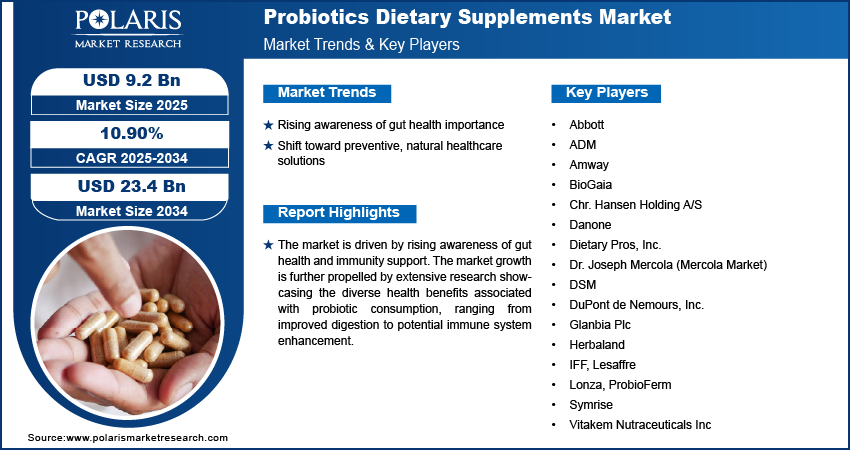Probiotics Dietary Supplements Market is projected to reach USD 23.4 billion by 2034, growing at a CAGR of 10.90%

The global probiotics dietary supplements market was valued at USD 8.3 billion in 2024 and is forecasted to grow at a CAGR of 10.90% from 2025 to 2034.
Market Trends & Insights:
- Rise in Preventive Healthcare Focus:
Consumers are increasingly adopting preventive healthcare practices, including the use of probiotics to avoid digestive and immunity-related disorders. - Personalized Nutrition Boom:
With the advent of microbiome-based research, companies are developing personalized probiotic supplements tailored to individual gut health profiles, boosting innovation in this space. - Expansion into New Age Groups:
While traditionally targeted at adults, probiotic supplements are now being formulated for children, seniors, and even pets, widening the consumer base. - Clean Label and Plant-Based Preferences:
Demand for organic, vegan, allergen-free, and clean-label probiotic products is surging, driven by ethical and health-conscious consumer behavior. - E-commerce and D2C Surge:
Online platforms and direct-to-consumer models are gaining traction, enhancing accessibility and enabling global reach, especially in emerging economies.
Market Size & Forecast
Market size value in 2025 USD – 9.2 billion
Revenue forecast in 2034 USD – 23.4 billion
CAGR – 10.90% from 2025 to 2034
Request for Free Sample:
Market Overview:
The Probiotics Dietary Supplements Market is witnessing substantial growth driven by rising consumer awareness regarding gut health, immunity, and overall wellness. Probiotics, known for their ability to support digestive and immune systems by maintaining a healthy balance of gut flora, have become a preferred choice among health-conscious individuals. These supplements are available in various forms such as capsules, tablets, powders, and gummies, and are increasingly integrated into daily health routines. Technological advancements in delivery systems and the clean-label movement are also helping reshape the landscape of this market.
Market Growth Drivers:
- Increased Awareness of Gut-Health Connection:
A growing body of scientific literature linking gut microbiota to mental health, skin conditions, and immune response is fueling consumer interest in probiotics. - Rising Digestive Health Issues:
Incidences of bloating, irritable bowel syndrome (IBS), and other gastrointestinal disorders are increasing globally, propelling demand for probiotic supplements. - Support from Healthcare Practitioners:
Medical professionals increasingly recommend probiotics alongside antibiotics or for general digestive support, lending credibility and driving adoption. - Innovation in Product Formats:
Advancements such as microencapsulation and shelf-stable strains have improved the viability and appeal of probiotic supplements. - Favorable Regulatory Frameworks:
Regulatory recognition of probiotics as safe and beneficial in regions like North America and Europe supports market legitimacy and growth.
Market Challenges:
- Strain-Specific Efficacy:
The effectiveness of Probiotics Dietary Supplements is strain-specific, and not all supplements are clinically proven, leading to consumer confusion and skepticism. - Regulatory Ambiguities in Some Regions:
Inconsistencies in labeling standards and health claims across countries can pose barriers for product approval and international expansion. - Stability and Shelf-Life Issues:
Ensuring probiotic viability during processing, storage, and delivery remains a technical challenge, especially in hot and humid climates. - High R&D and Production Costs:
Developing effective and stable probiotic formulations can be capital-intensive, potentially limiting smaller manufacturers. - Consumer Misinformation:
Misleading marketing claims and lack of public education about appropriate strains and dosages could undermine trust in probiotic supplements.






